Fleurs du Mal Magazine


Or see the index
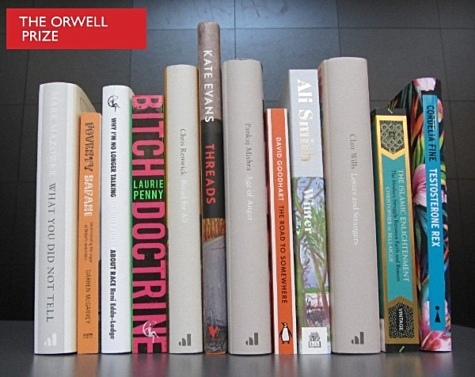
The longlist of The Orwell Prize for Books 2018 features historical writing, fiction and for the first time a graphic novel.
The Islamic Enlightenment: The Modern Struggle Between Faith and Reason, Christopher de Bellaigue (Bodley Head). An absorbing account of the political and social reformations that transformed the lands of Islam in the nineteenth and early twentieth centuries)
Why I’m No Longer Talking to White People about Race, Reni Eddo-Lodge (Bloomsbury). A book on racial inequalities, exploring issues from eradicated black history to the political purpose of white dominance, whitewashed feminism to the inextricable link between class and race
 Threads from the Refugee Crisis, Kate Evans (Verso). Combining the techniques of eyewitness reportage with the medium of comic-book storytelling, Evans has produced a compelling view into the life of asylum seekers living in Calais’s ‘Jungle’.
Threads from the Refugee Crisis, Kate Evans (Verso). Combining the techniques of eyewitness reportage with the medium of comic-book storytelling, Evans has produced a compelling view into the life of asylum seekers living in Calais’s ‘Jungle’.
Testosterone Rex, Cordelia Fine (Icon Books). A book explaining why past and present sex roles are only serving suggestions for the future. It reveals a much more dynamic situation through an entertaining and well-documented exploration of the latest research that draws on evolutionary science, psychology, neuroscience, endocrinology, and philosophy.
The Road to Somewhere – The Populist Revolt and the Future of Politics, David Goodhart (Hurst Publishers). An exposition of how the political elites have failed their societies. This investigation into the new global politics reveals how the Somewhere backlash is a democratic response to the dominance of Anywhere interests, in everything from mass higher education to mass immigration.
What You Did Not Tell, Mark Mazower (Allen Lane). In the centenary of the Russian Revolution, What You Did Not Tell recounts a brand of socialism erased from memory – humanistic, impassioned, and broad-ranging in its sympathies. But it also explores the unexpected happiness that may await history’s losers, the power of friendship, and the love of place.
 Poverty Safari, Darren McGarvey (Luath Press). People from deprived communities all across Britain feel misunderstood and unheard. Darren McGarvey, aka Loki, gives voice to their feelings and concerns, and anger that is spilling over.
Poverty Safari, Darren McGarvey (Luath Press). People from deprived communities all across Britain feel misunderstood and unheard. Darren McGarvey, aka Loki, gives voice to their feelings and concerns, and anger that is spilling over.
Age of Anger: A History of the Present, Pankaj Mishra (Allen Lane). How can we explain the origins of the great wave of paranoid hatreds that seem inescapable in our close-knit world – from American ‘shooters’ and ISIS to Trump? Pankaj Mishra answers our bewilderment by casting his gaze back to the eighteenth century, before leading us to the present.
Bitch Doctrine, Laurie Penny (Bloomsbury) Bread for All:The Origins of the Welfare State, Chris Renwick (Allen Lane). This collection of Laurie Penny’s writing covers everything from the shock of Donald Trump’s election and the victories of the far right, to online harassment and the transgender rights movement. These darkly humorous articles provoke challenging conversations about the definitive social issues of today.
Winter, Ali Smith (Hamish Hamilton). In the second novel in her Seasonal cycle, Smith’s shape-shifting quartet of novels casts a merry eye over a bleak post-truth era with a story rooted in history, memory and warmth, its taproot deep in the evergreens: art, love, laughter.
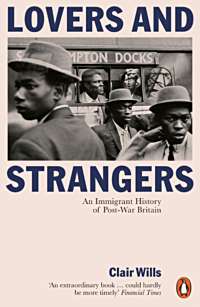 Lovers and Strangers: An Immigrant History of Post-War Britain, Clair Wills (Allen Lane). Clair Wills’ book brings to life the incredible diversity and strangeness of the migrant experience. She introduces us to lovers, scroungers, dancers, homeowners, teaches, drinkers, carers and many more to show the opportunities and excitement as much as the humiliation and poverty that could be part of the new arrivals’ experience.
Lovers and Strangers: An Immigrant History of Post-War Britain, Clair Wills (Allen Lane). Clair Wills’ book brings to life the incredible diversity and strangeness of the migrant experience. She introduces us to lovers, scroungers, dancers, homeowners, teaches, drinkers, carers and many more to show the opportunities and excitement as much as the humiliation and poverty that could be part of the new arrivals’ experience.
The judges for the Orwell Prize for Books are politician, academic and journalist Andrew Adonis (Chair), Literary Journalist and Artistic Director of Words and Literature of the Bath Festival, Alex Clark, author Kit de Waal, and Lorien Kite, Deputy Life & Arts Editor for the Financial Times.
The shortlist for The Orwell Prize for Books will be announced at The Bath Festival on 18th May. The winner of the £3000 prize will be unveiled on 25th June 2018 at The RSA, together with the winner of The Orwell Prize for Journalismand The Orwell Prize for Exposing Britain’s Social Evils.
Previous winners of the Orwell Prize for Books include John Bew for his biography of Clement Attlee (2017), Raja Shehadeh (2008), Alan Johnson (2014), and Andrea GiThe judges for the Orwell Prize for Booksllies (2010).
The Orwell Prize 2018 is for work published in the calendar year 2018. For more details and rules of entry please visit www.orwellfoundation.com
orwell-prize 2018
fleursdumal.nl magazine
More in: - Book Lovers, - Book News, Art & Literature News, Awards & Prizes, George Orwell, PRESS & PUBLISHING
Al vroeg in de ochtend vertrekt zijn vader in de zwarte Ford naar de boeren, om graan in te kopen voor de meelfabriek.
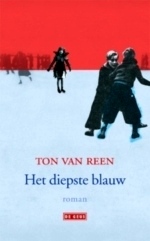 Zijn werk kost zweet, bloed en tranen. Directeur Frits schrijft zijn vader voor hoeveel hij uit mag geven en daar mag hij geen cent bovenop doen.
Zijn werk kost zweet, bloed en tranen. Directeur Frits schrijft zijn vader voor hoeveel hij uit mag geven en daar mag hij geen cent bovenop doen.
`Onderhandelen met boeren over een prijs is bijna onmogelijk’, zegt vader. `Ze willen het onderste uit de kan. De room is voor de boeren en toch voelen ze zich altijd bestolen.’
Wat vader over de boeren vertelt, is precies het tegenovergestelde van wat grootvader Bernhard erover vertelt. Die zegt altijd dat de boeren te weinig krijgen.
Vader zwerft door het hele land. Bijna elke week brengt hij handdoeken mee waarop de namen van de hotels zijn geborduurd. Moeder is daar kwaad over, omdat hij ze pikt, maar hij zegt dat hij erom vraagt en ze krijgt als souvenirs. Ze hebben er een kast vol van, maar moeder gebruikt ze nooit.
Vader is alleen op zondag thuis, maar ook dan heeft hij geen tijd voor Mels. Dan gaat hij naar de hoogmis en daarna kaarten in het café. Daar is dan ook de jonge directeur Frans-Joseph, die een kwade dronk heeft. In het café gaat hij net zo tekeer tegen zijn kaartvrienden als door de week tegen de arbeiders. Niemand durft tegen hem te zeggen dat ze liever zonder hem kaarten. Zeker Mels’ vader niet.
`Rot maar op’, hoeft Frans-Joseph maar te zeggen. `Rot jij maar op.’ Zoals hij dat soms tegen mensen zegt als hun gezicht hem niet aanstaat of hun werk hem niet bevalt. Ze moeten altijd oppassen voor de directeuren.
Het kaarten eindigt meestal met ruzie. Vaak gaat Frans-Joseph met herrie naar huis. Als vader na zo’n kaartpartij thuiskomt, zegt hij geen stom woord en heeft hij hoofdpijn.
Soms zoekt Mels zijn vader op in het café. Dan krijgt hij limonade. Maar daar is het hem niet om te doen. Hij wil hem alleen maar vragen om naar huis te komen, omdat moeder op hem zit te wachten. Vader blijft altijd net zo lang in het café als de directeur en vaak is dat tot aan het avondeten.
Slechts op een enkele zondag, als Frans-Joseph op reis is of gewoon op vakantie, gaan ze met het gezin een stukje rijden. Na het middagdutje van vader. Nooit ver. Vader rijdt niet graag op zondag. Mels vindt die korte ritjes niet erg. Later haalt hij de schade wel in. Dan koopt hij zelf een Ford of een Borgward Isabella. Net zo’n grote zwarte bak als directeur Frits heeft.
Ton van Reen: Het diepste blauw (039)
wordt vervolgd
fleursdumal.nl magazine
More in: - Book Stories, - Het diepste blauw, Archive Q-R, Reen, Ton van
Hij hoort ritselen, boven het plafond. Om muizen stil te krijgen, hoef je alleen maar aan ze te denken. Ze lezen je gedachten. Ze hebben er iets voor in hun hersenen, een zintuig dat hun zegt: pas op voor mensen, mensen zijn moordenaars.
 Hij kijkt weer in de spiegel. Het weinige, overgebleven haar. Hij is heel anders dan hoe hij zichzelf zou willen zien. Ouder. Moe. Pafferig. Hij wendt de blik af. Als hij al niet zonder afkeer naar zichzelf kan kijken, hoe kan hij dan van anderen verlangen dat ze hem wél liefdevol tegemoet treden? Waarom is de buitenkant van zijn hoofd zo anders dan wat er in de binnenkant leeft? In zijn hoofd is hij jong, soms een kind en rent hij rond, onvermoeibaar. Vroeger heeft hij zich nooit kunnen voorstellen dat hij zo oud zou worden als zijn vader, laat staan als zijn grootvader. Maar in jaren heeft hij zijn vader allang overleefd. Zijn grootvader Bernhard heeft hij al bijna ingehaald. Zo oud als grootvader Rudolf wil hij niet eens worden. Het was beter geweest dat hij net zo jong was gestorven als zijn vader, dan had hij deze ellendige tijd niet hoeven mee te maken. Wie vroeg sterft, laat een hoop ellende aan zich voorbijgaan. Als zijn vader oud was geworden, zou hij alleen maar ongelukkig zijn geweest.
Hij kijkt weer in de spiegel. Het weinige, overgebleven haar. Hij is heel anders dan hoe hij zichzelf zou willen zien. Ouder. Moe. Pafferig. Hij wendt de blik af. Als hij al niet zonder afkeer naar zichzelf kan kijken, hoe kan hij dan van anderen verlangen dat ze hem wél liefdevol tegemoet treden? Waarom is de buitenkant van zijn hoofd zo anders dan wat er in de binnenkant leeft? In zijn hoofd is hij jong, soms een kind en rent hij rond, onvermoeibaar. Vroeger heeft hij zich nooit kunnen voorstellen dat hij zo oud zou worden als zijn vader, laat staan als zijn grootvader. Maar in jaren heeft hij zijn vader allang overleefd. Zijn grootvader Bernhard heeft hij al bijna ingehaald. Zo oud als grootvader Rudolf wil hij niet eens worden. Het was beter geweest dat hij net zo jong was gestorven als zijn vader, dan had hij deze ellendige tijd niet hoeven mee te maken. Wie vroeg sterft, laat een hoop ellende aan zich voorbijgaan. Als zijn vader oud was geworden, zou hij alleen maar ongelukkig zijn geweest.
Ton van Reen: Het diepste blauw (038)
wordt vervolgd
fleursdumal.nl magazine
More in: - Book Stories, - Het diepste blauw, Archive Q-R, Reen, Ton van
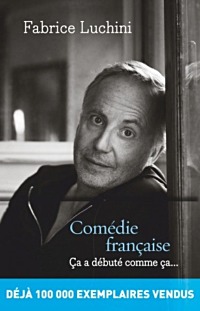 Il nous a fait redécouvrir La Fontaine, Rimbaud et Céline.
Il nous a fait redécouvrir La Fontaine, Rimbaud et Céline.
Il incarne l’esprit et le panache de la langue française. En prose, en vers et même en verlan, il a donné sa voix à d’immenses auteurs, auxquels il sait faire respirer l’air de notre temps – en racontant la fureur du Misanthrope à l’ère du téléphone portable, ou la sensualité de “La Laitière et le pot au lait” sur l’air d’une publicité pour Dim.
Il a quitté l’école à quatorze ans pour devenir apprenti coiffeur. Il est aujourd’hui l’un de nos plus grands comédiens, célébré pour ses lectures-spectacles, couronné par la Mostra de Venise pour son rôle dans son dernier film, L’Hermine.
Dans son autobiographie, Fabrice Luchini livre le récit d’une vie placée sous le signe de la littérature, à la recherche de la note parfaite.
Fabrice Luchini est né à Paris en 1951. Lancé par Philippe Labro et Éric Rohmer alors qu’il est encore apprenti coiffeur, révélé par le film La Discrète, en 1990, il est l’un des plus grands acteurs français. Il donne depuis plus de vingt ans des spectacles, désormais entrés dans la légende, consacrés aux auteurs qu’il aime. Il a été sacré meilleur acteur à la Mostra de Venise pour son rôle dans L’Hermine de Christian Vincent. Comédie française est son premier livre.
Fabrice Luchini
Comédie française
Ça a débuté comme ça
Paru le 02/03/2016
Genre: Essais littéraires
256 pages
135 x 210 mm
Broché
ISBN-10: 2081379171
ISBN-13: 978-2081379176
€19,00
Ed. Flammarion
new books
fleursdumal.nl magazine
More in: - Book Stories, Archive K-L, Art & Literature News, La Fontaine, Jean de, Louis-Ferdinand Céline, Rimbaud, Arthur, THEATRE
In The Mathematics of the Breath and the Way, Charles Bukowski considers the art of writing, and the art of living as writer.
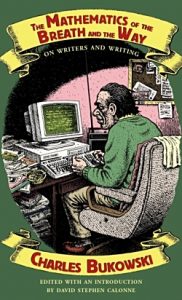 Bringing together a variety of previously uncollected stories, columns, reviews, introductions, and interviews, Mathematics finds him approaching the dynamics of his chosen profession with cynical aplomb, deflating pretentions and tearing down idols armed with only a typewriter and a bottle of beer.
Bringing together a variety of previously uncollected stories, columns, reviews, introductions, and interviews, Mathematics finds him approaching the dynamics of his chosen profession with cynical aplomb, deflating pretentions and tearing down idols armed with only a typewriter and a bottle of beer.
Beginning with the title piece—a serious manifesto disguised as off-handed remarks en route to the racetrack—Mathematics runs through numerous tales following the author’s adventures at poetry readings, parties, film sets, and bars, and also features an unprecedented gathering of Bukowski’s singular literary criticism.
From classic authors like Hemingway to underground legends like d.a. levy to his own stable of obscure favorites, Bukowski uses each occasion to expound on the larger issues around literary production.
The book closes with a handful of interviews in which he discusses his writing practices and his influences, making Mathematics a perfect guide to the man behind the myth and the disciplined artist behind the boozing brawler.
The method behind the madness, revealing the critical acumen of everyone’s favorite Dirty Old Man.
“Genius could be the ability to say a profound thing in a simple way, or even to say a simple thing in a simpler way.”—Charles Bukowski
Charles Bukowski was born in Andernach, Germany on August 16, 1920, the only child of an American soldier and a German mother. At the age of three, he came with his family to the United States and grew up in Los Angeles. He attended Los Angeles City College from 1939 to 1941, then left school and moved to New York City to become a writer. His lack of publishing success at this time caused him to give up writing in 1946 and spurred a ten-year stint of heavy drinking. After he developed a bleeding ulcer, he decided to take up writing again. He worked a wide range of jobs to support his writing, including dishwasher, truck driver and loader, mail carrier, guard, gas station attendant, stock boy, warehouse worker, shipping clerk, post office clerk, parking lot attendant, Red Cross orderly, and elevator operator. He also worked in a dog biscuit factory, a slaughterhouse, a cake and cookie factory, and he hung posters in New York City subways.
Bukowski published his first story when he was twenty-four and began writing poetry at the age of thirty-five. His first book of poetry was published in 1959; he went on to publish more than forty-five books of poetry and prose, including Pulp (Black Sparrow, 1994), Screams from the Balcony: Selected Letters 1960-1970 (1993), and The Last Night of the Earth Poems (1992), and the following books with City Lights Publishers: Notes of a Dirty Old Man (1981), The Most Beautiful Woman in Town & Other Stories (1983), Tales of Ordinary Madness (1984), Portions from a Wine-Stained Notebook: Uncollected Stories and Essays, 1944-1990 (2008), Absence of the Hero: Uncollected Stories and Essays, Vol. 2: 1946-1992 (2010), More Notes of a Dirty Old Man: The Uncollected Columns (2011), and The Bell Tolls for No One (2015). He died of leukemia in San Pedro on March 9, 1994.
Title: The Mathematics of the Breath and the Way
Subtitle: On Writers and Writing
Author: Charles Bukowski
Introduction by David Stephen Calonne
Edited by David Stephen Calonne
Publisher: City Lights Publishers
Format Paperback
ISBN-10 0872867595
ISBN-13 9780872867598
250 Pages
List Price $16.95
Publication Date 15 May 2018
new books
fleursdumal.nl magazine
More in: - Book News, Archive A-B, Archive A-B, Art & Literature News, Bukowski, Charles, Opium-Eaters
Thija hinkelt altijd. Ze loopt nooit gewoon.
`Kom je?’ roept ze door de brievenbus.
 Mels vliegt de trap af.
Mels vliegt de trap af.
Thija zit op het stoepje, haar benen recht vooruit, in haar hand een witte muis.
`Gekregen’, zegt ze. `Witte muizen brengen geluk.’
`Van je vader?’
`Hij was een avond thuis. Hij is weer weg. Vanochtend vroeg al.’
`Nu heb ik hem nog niet gezien.’
`Als hij meer tijd heeft …’
`Hij heeft nooit tijd.’
De muis klimt langs haar jurk omhoog, tot aan haar nek. Hij snuffelt aan de boothals van haar jurk, die veel van haar borst bloot laat. Haar sleutelbeenderen zijn de kapstok waar haar jurk aan hangt.
De muis kruipt onder de jurk.
`Pas op. Hij bijt.’
`Welnee. Hij wil melk.’
`Heksenmelk?’
`Je bent bang, hè, dat ik je betover! Ik wacht nog even. Straks. Dan delen we het snoep dat ik van mijn vader heb gekregen. Ik kan het niet bewaren. Er zitten muizen op zolder. ‘s Nachts komen ze op mijn kamer.’
`Jij bent toch niet bang van muizen. Je hebt er zelf een.’
`Deze is wit. Die is lief, maar grijze muizen zijn eng.’
Ton van Reen: Het diepste blauw (037)
wordt vervolgd
fleursdumal.nl magazine
More in: - Book Stories, - Het diepste blauw, Archive Q-R, Reen, Ton van
 “Il fallait bien qu’un jour je croise la route de Lady Chatterley. J’ai fait mieux, je suis tombée amoureuse de celui qui l’imagina, D. H. Lawrence, à cause de sa figure de mauvais coucheur, à cause de l’extraordinaire sensibilité de son “écriture androgyne” dont parlait Anaïs Nin.
“Il fallait bien qu’un jour je croise la route de Lady Chatterley. J’ai fait mieux, je suis tombée amoureuse de celui qui l’imagina, D. H. Lawrence, à cause de sa figure de mauvais coucheur, à cause de l’extraordinaire sensibilité de son “écriture androgyne” dont parlait Anaïs Nin.
Pendant deux ans, je n’ai pas quitté cet amateur des grands espaces qui, lorsqu’il écrivait, ne s’est jamais encombré des barrières du surmoi. J’ai voulu faire redécouvrir cet auteur célèbre qui n’est plus assez lu, contemporain des suffragettes, et qui vécut entouré de femmes libres. Il avait compris qu’au vortex de leur émancipation et de leurs revendications se trouvait le plein accomplissement de leur jouissance sexuelle.” Catherine Millet.
Catherine Millet
Aimer Lawrence
Paru le 20/09/2017
Genre: Essais littéraires
304 pages
138 x 210 mm
Broché
ISBN-10: 2081372614
ISBN-13: 978-2081372610
€21,00
Editeur : Flammarion
Langue : Français
new books
fleursdumal.nl magazine
More in: - Book Stories, Archive K-L, Archive M-N, D.H. Lawrence, Erotic literature, Lawrence, D.H.
Mels bestudeert zijn gezicht in de spiegel. Altijd heeft hij gezocht naar overeenkomsten met hem en zijn vader en zijn grootvader Rudolf. Maar hij heeft nooit iets van hen in zijn eigen gezicht herkend. Hij heeft de rimpels van iemand die zijn hele leven met veel vragen zit, maar er geen antwoorden op kan vinden.
 `Je ontbijt is klaar!’ Hij weet precies hoe Lizet daar staat, onder aan de trap.
`Je ontbijt is klaar!’ Hij weet precies hoe Lizet daar staat, onder aan de trap.
`Ik kom.’ Vlug poetst hij zijn tanden en gooit de plaid over zijn benen. Hij rolt naar de deur, maar stopt bij de boekenkast. Even strelen zijn vingers de boeken die hij over China heeft verzameld. Hij heeft ze vaak herlezen. Vooral de oude boeken. Toen China nog een sprookjeswereld was en de Chinezen nog niet met zo veel waren en allemaal verschillend. Vóór de tijd dat ze in die rare pyjamapakken liepen. Nieuwe boeken over China wil hij niet. De nieuwe Chinezen, die hetzelfde proberen te zijn als Amerikanen of Europeanen, laten hem koud.
Hij bladert even door een map. Rangschikt een paar foto’s. Hij moet alles meenemen naar de lezing die hij straks zal geven.
Hij rolt door naar de lift bij de trap en klikt zijn rolstoel vast. Hij kan het ding zelf bedienen. Het is een uitkomst. Voordat de lift werd geïnstalleerd, had hij twee jaar vastgezeten op de bovenverdieping. Hij had het contact met de mensen bijna verloren. Toevallig dat iemand die hij had leren kennen in de verpleegkliniek hem over die lift had geschreven.
Langzaam zakt de lift langs de trap naar beneden en stopt precies voor de twee uitvergrote foto’s van de Wijer aan de wand in het halletje. De Wijer in de zomer, fluisterend tussen bloemtapijten. De Wijer in de winter, glinsterend donkerblauw ijs tussen witte velden. Het diepste blauw. Hij heeft de foto’s zelf genomen en ze op plaatsen gehangen waar vroeger de schilderstukjes van Hubert Graus hingen. Die heeft hij op de zolder gezet. Zelf gemaakt leek altijd beter, al zou hij nu de schilderijen graag weer van de zolder halen. Het waren gedroomde plaatjes. Romantisch. Met meer licht dan er ooit was geweest en in kleuren die feller waren dan in het echt. Ze drukten uit hoe mooi ook Graus de Wijer vond.
Hij rijdt naar de keuken die vol is van het lawaai van de afzuigkap. Sinds ze zelf geen koffie meer drinkt, heeft Lizet een hekel aan de geur.
Ze schenkt een kop in en legt de krant voor hem op tafel. Ze loopt nog steeds in nachtjapon en ochtendjas, ook al weet ze dat hij daar niet van houdt.
`Er was vannacht wat te doen bij de meelfabriek’, zegt ze, over het lawaai van de afzuigkap heen. `Ik heb politie gezien. Er stond groot licht op de silo. Het leek wel film.’
`Ik heb een vliegtuig gehoord.’
`Dieven hebben bouwmateriaal gestolen.’
`Ze bouwen appartementen in de silo’, zegt Mels.
`Wie bedenkt zoiets? Net of het iets moois is.’
`Het is een monument. Het enige opvallende gebouw dat het dorp heeft, naast de watermolen.’
`Het dorp zou mooier zijn zonder dat kreng’, zegt ze. `Straks krijg je nog toeristen. De dieven gaan hun al vooruit.’
`In mijn boek …’
`Hou daar toch mee op. Je schrijft dingen die je niet meent. Je moet aardig blijven voor iedereen. Ook voor de directeuren. Het wordt niks. Het staat vol leugens.’
`Heb je erin gelezen?’
`Je verzwijgt dat jij het was die de mensen hun ontslag moest geven.’
`Dat deed ik niet uit mezelf!’
`Dadelijk, als je die presentatie houdt, zullen ze je er misschien naar vragen. Ik heb het altijd rot gevonden. Die directeuren zitten ver weg. Jij bent er nog. Jou kijken ze erop aan.’
Het doet hem pijn, maar ze heeft gelijk. De jaren dat er gebrek was aan werk, omdat meel uit Amerika werd verkocht onder de kostprijs van het meel van de fabriek, beleefde hij de slechtste momenten uit zijn bestaan. De bazen lieten hem het vuile werk opknappen. Hij moest de mensen op straat zetten, in een tijd dat ook elders weinig werk te vinden was. De arbeiders hadden hem kwalijk genomen dat hij onder één hoedje speelde met de directeuren. Hij had die judasrol moeten weigeren, maar hij was bang geweest voor zijn eigen baan.
Hij eet een snee brood, met jam, heel dun. Geen boter, vanwege zijn buik.
Marjan komt binnen, om hem aan te kleden.
`Ben je klaar?’
`Ik ben net beneden.’
`Ik heb haast.’ Sinds de verpleegster van het Groene Kruis niet meer komt, helpt zijn dochter hem elke ochtend. Voor Lizet is hij te zwaar. Uitkleden kan ze hem wel, maar aankleden niet meer.
Haastig neemt hij een slok van de hete koffie, rolt terug naar de lift en zoemt naar boven.
Marjan heeft zijn kleren al op bed gelegd. Hij doet zijn kamerjas uit. Ze trekt zijn pyjama en bezwete ondergoed uit. Haar koude handen ergeren hem.
`Je ruikt naar pillen.’
`Ik kan het niet helpen dat je die dingen ruikt.’
`Ik zeg niet dat je stinkt.’
`Je zegt het elke dag.’
`Je ruikt naar een apotheek. Ik zeg toch niet dat een apotheek stinkt.’
`In China verkopen ze darmen van apen en vleermuizen als medicijn.’
`Dan lopen ze daar behoorlijk achter.’
Ze wast hem. Routineus doet ze hem schoon ondergoed aan, een overhemd, een wijde trainingsbroek, sokken, pantoffels.
`Jij met je China. Wat weet je over ons?’
`Alles.’
`Laat maar. Je bent net een klein kind, dat is ook altijd alleen met zichzelf bezig. Dat vindt het ook gewoon dat het verzorgd wordt.’ Ze kijkt hem geïrriteerd aan. Elke week verwijt ze hem wel een keer dat hij ondankbaar is, dat hij zich aanstelt, dat hij geen rekening houdt met haar en met haar moeder.
`Ik had vandaag willen uitslapen. Herman is thuis. Maar ik moest eruit voor jou. Is het niet voor de baby, dan is het voor jou.’
Hij moet op zijn tanden bijten. Hij wil niet schreeuwen, maar hij schreeuwt het opeens uit.
`Laat me dan barsten! Duw me maar door het raam naar buiten! Duw me de brug af, dan kun je elke dag uitslapen!’
Ze rolt hem naar de spiegel.
`Schreeuw maar. Kijk naar jezelf. Hoe je eruitziet als je schreeuwt! Zie je die kop!’
Ze loopt de kamer uit. Verslagen blijft hij achter. Te klein om voor zichzelf te kunnen zorgen. Niet groot genoeg om zichzelf in bedwang te houden.
Terwijl hij met nijdige bewegingen zijn haar kamt en zichzelf in de spiegel bekijkt, hoort hij haar naar beneden lopen. Het driftige tikken van haar hakken over de tegels in de keuken. De dichtvallende keukendeur. De slaande voordeur. Haar wegstervende voetstappen op straat. Het lijkt wel of ze rent. Hij blijft ernaar luisteren, tot hij andere passen hoort die dichterbij komen. Een kind loopt hinkelend over het trottoir. Stip, stip, stap. Stip, stip.
Ton van Reen: Het diepste blauw (036)
wordt vervolgd
fleursdumal.nl magazine
More in: - Book Stories, - Het diepste blauw, Archive Q-R, Reen, Ton van
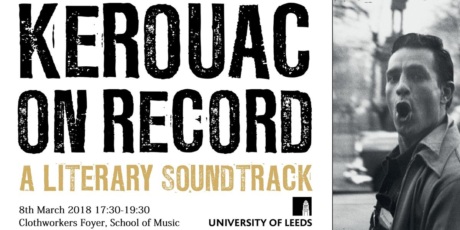
Out now:
Kerouac on Record ◊ A Literary Soundtrack
Edited by Simon Warner and Jim Sampas
Co-edited by Jack Kerouac’s nephew, including pieces written by Kerouac himself as well as interviews from major literary and musical figures including Allen Ginsberg, Lee Konitz and David Amram, Kerouac on Record gives a unique insight into how Kerouac brought his passion for jazz to his full creative output.
Kerouac on Record is the touchstone for the music of Kerouac – Kerouac’s love for music, the depth of its influence on his work, and the influence that his work continues to extend to waves of contemporary musicians, from David Bowie and Janis Joplin to Sonic Youth. It is a book rife with the work of cultural icons, essential for any fan of the Beat Generation and popular music alike.
About Kerouac on Record
He was the leading light of the Beat Generation writers and the most dynamic author of his time, but Jack Kerouac also had a lifelong passion for music, particularly the mid-century jazz of New York City, the development of which he witnessed first-hand during the 1940s with Charlie Parker, Dizzy Gillespie and Thelonious Monk to the fore.
The novelist, most famous for his 1957 book On the Road, admired the sounds of bebop and attempted to bring something of their original energy to his own writing, a torrent of semi-autobiographical stories he published between 1950 and his early death in 1969.
Yet he was also drawn to American popular music of all kinds – from the blues to Broadway ballads – and when he came to record albums under his own name, he married his unique spoken word style with some of the most talented musicians on the scene.
Kerouac’s musical legacy goes well beyond the studio recordings he made himself: his influence infused generations of music makers who followed in his work – from singer-songwriters to rock bands.
Some of the greatest transatlantic names – Bob Dylan and the Grateful Dead, Van Morrison and David Bowie, Janis Joplin and Tom Waits, Sonic Youth and Death Cab for Cutie, and many more – credited Kerouac’s impact on their output.
In Kerouac on Record, we consider how the writer brought his passion for jazz to his prose and poetry, his own record releases, the ways his legacy has been sustained by numerous more recent talents, those rock tributes that have kept his memory alive and some of the scores that have featured in Hollywood adaptations of the adventures he brought to the printed page.
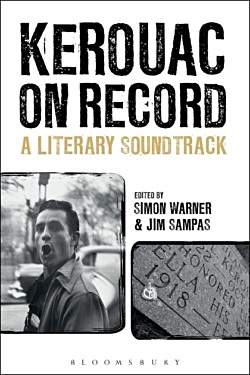 1. Jack Kerouac’s Jazz Scene Jim Burns – 2. 2nd Chorus: Blues: Jack Kerouac Larry Beckett – 3. Duet for Saxophone and Pen: Lee Konitz and the Direct Influence of Jazz on the Development of Jack Kerouac’s ‘Spontaneous Prose’ Style Marian Jago Interview 1: Lee Konitz Marian Jago – 4. Jack Kerouac Goes Vinyl: A Sonic Journey into Kerouac’s Three LPs: Poetry for the Beat Generation; Blues and Haikus; and Readings by Jack Kerouac on the Beat Generation Jonah Raskin – 5. Art Music: Listening to Kerouac’s ‘Mexico City Blues’ A. Robert Lee Interview 2: David Amram Pat Thomas – 6. Beat Refrains: Music, Milieu and Identity in Jack Kerouac’s The Subterraneans, the Metro-Goldwyn-Mayer Film Adaptation Michael Prince – 7. Bob Dylan’s Beat Visions (Sonic Poetry) Michael Goldberg – 8. Carrying a Torch for Ti Jean Paul Marion Interview 3: Richard Meltzer Michael Goldberg – 9. The Grateful Dead: Jack Manifested as Music Brian Hassett – 10. Driver Mark Bliesener – 11. Jim Morrison/Angel of Fire Jay Jeff Jones – 12. Light is Faster than Sound: Texans, the Beats and the San Francisco Counterculture Holly George-Warren – 13. Hit the Road, Jack: Van Morrison and On the Road Peter Mills – 14. Detecting Jack Kerouac and Joni Mitchell: A Literary/Legal (Not Musicological) Investigation into the Search for Influence Nancy Grace – 15. Kerouac and Country Music Matt Theado – 16. ‘Straight from the Mind to the Voice’: Spectral Persistence in Jack Kerouac and Tom Waits Douglas Field Interview 4: Barney Hoskyns Simon Warner – 17. From Beat Bop Prosody to Punk Rock Poetry: Patti Smith and Jack Kerouac; Literature, Lineage, Legacy Ronna Johnson Poems: Marc Zegans Interview 6: Allen Ginsberg Pat Thomas – 18. Tramps Like Them: Jack and Bruce and the Myth of the American Road Simon Morrison Interview 5: Graham Parker Pat Thomas – 19. Punk and New Wave James Sullivan – Interview 7: Jim DeRogatis on Lester Bangs James Sullivan – 20. The Tribute Recordings Jim Sampas and Simon Warner – Jack Kerouac Biography – Jack Kerouac Discography Dave Moore – Tribute Discography – Kerouac/Cassady Song List Dave Moore/Horst Spandler
1. Jack Kerouac’s Jazz Scene Jim Burns – 2. 2nd Chorus: Blues: Jack Kerouac Larry Beckett – 3. Duet for Saxophone and Pen: Lee Konitz and the Direct Influence of Jazz on the Development of Jack Kerouac’s ‘Spontaneous Prose’ Style Marian Jago Interview 1: Lee Konitz Marian Jago – 4. Jack Kerouac Goes Vinyl: A Sonic Journey into Kerouac’s Three LPs: Poetry for the Beat Generation; Blues and Haikus; and Readings by Jack Kerouac on the Beat Generation Jonah Raskin – 5. Art Music: Listening to Kerouac’s ‘Mexico City Blues’ A. Robert Lee Interview 2: David Amram Pat Thomas – 6. Beat Refrains: Music, Milieu and Identity in Jack Kerouac’s The Subterraneans, the Metro-Goldwyn-Mayer Film Adaptation Michael Prince – 7. Bob Dylan’s Beat Visions (Sonic Poetry) Michael Goldberg – 8. Carrying a Torch for Ti Jean Paul Marion Interview 3: Richard Meltzer Michael Goldberg – 9. The Grateful Dead: Jack Manifested as Music Brian Hassett – 10. Driver Mark Bliesener – 11. Jim Morrison/Angel of Fire Jay Jeff Jones – 12. Light is Faster than Sound: Texans, the Beats and the San Francisco Counterculture Holly George-Warren – 13. Hit the Road, Jack: Van Morrison and On the Road Peter Mills – 14. Detecting Jack Kerouac and Joni Mitchell: A Literary/Legal (Not Musicological) Investigation into the Search for Influence Nancy Grace – 15. Kerouac and Country Music Matt Theado – 16. ‘Straight from the Mind to the Voice’: Spectral Persistence in Jack Kerouac and Tom Waits Douglas Field Interview 4: Barney Hoskyns Simon Warner – 17. From Beat Bop Prosody to Punk Rock Poetry: Patti Smith and Jack Kerouac; Literature, Lineage, Legacy Ronna Johnson Poems: Marc Zegans Interview 6: Allen Ginsberg Pat Thomas – 18. Tramps Like Them: Jack and Bruce and the Myth of the American Road Simon Morrison Interview 5: Graham Parker Pat Thomas – 19. Punk and New Wave James Sullivan – Interview 7: Jim DeRogatis on Lester Bangs James Sullivan – 20. The Tribute Recordings Jim Sampas and Simon Warner – Jack Kerouac Biography – Jack Kerouac Discography Dave Moore – Tribute Discography – Kerouac/Cassady Song List Dave Moore/Horst Spandler
Simon Warner
is a journalist, lecturer and broadcaster who teaches Popular Music Studies at the University of Leeds in the UK. He has, over a number of years, written live reviews and counterculture obituaries for The Guardian and The Independent, and has a particular interest in the relationship between the Beat Generation writers–Jack Kerouac, Allen Ginsberg, William Burroughs and others–and rock culture. His previous books include Rockspeak: The Language of Rock and Pop (1996) and Howl for Now: A Celebration of Allen Ginsberg’s epic protest poem (2005). – Writes: Popular Music, North American Literature – Author of : Kerouac on Record, Text and Drugs and Rock ‘n’ Roll
Jim Sampas
is a music and film producer. His musical works often focuses on major cultural figures such Jack Kerouac (who is his Uncle), The Beatles, Bruce Springsteen, The Smiths, Bob Dylan, and The Rolling Stones. He has persuaded a galaxy of stars to partake of a unique aesthetic marriage, as vintage works are resurrected in contemporary arrangements in projects covered by such major news outlets as People Magazine, NPR, The New York Times, Entertainment Weekly, Rolling Stone, and many others. – Writes: Popular Music, North American Literature – Author of: Kerouac on Record
Following Text and Drugs and Rock ‘n’ Roll: The Beats and Rock Culture (2013), Simon Warner partners with Literary Executor of the Estate of Jack Kerouac, Jim Sampas, to go deeper into his exploration of the connections between the great figures of the Beat generation and the music of the so-called ‘rock era.’ Interspersed with exclusive interviews of the likes of Lee Konitz, Graham Parker, Lester Bangs, and Allen Ginsberg, the twenty chapters are signed by an impressive array of journalists, music industry professionals, rock critics, writers, film makers and academics from all over the world. Addressing such issues as the influence of jazz on Kerouac’s ‘spontaneous prose’ style, the lineage between his ‘Beat bop prosody’ and Patti Smith‘s ‘punk rock poetry,’ or his inspiring ‘the myth of the American road’ in Bruce Springsteen’s lyrics, they shed light on what appears to be a two-way relationship between popular music and the work of the author of On the Road. As Warner puts it: ‘if, for Kerouac, it was jazz that would have the principal impact, then it was rock on which the writer would have the main effect.’” – Olivier Julien, Lecturer in the History and Musicology of Popular Music, Paris-Sorbonne University, France
Kerouac on Record
A Literary Soundtrack
By: Simon Warner, Jim Sampas
Published: 08-03-2018
Format: Hardback
Edition: 1st
Extent: 480
ISBN: 9781501323348
Imprint: Bloomsbury Academic
Dimensions: 229 x 152 mm
RRP: £28.00
Kerouac on Record
A Literary Soundtrack
fleursdumal.nl magazine
More in: # Music Archive, #Beat Generation Archives, - Book Stories, Archive G-H, Archive G-H, Archive K-L, Archive K-L, Art & Literature News, AUDIO, CINEMA, RADIO & TV, Bob Dylan, Dylan, Bob, Ginsberg, Allen, Jim Morrison, Joni Mitchell, Kerouac, Jack, Patti Smith
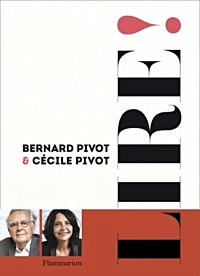 Bernard Pivot, lecteur professionnel (“Apostrophes”, Lire, JDD) et sa fille Cécile, ardente lectrice amateur, confrontent leurs raisons, plaisirs et manières de lire, leur usage des livres, dans des textes très personnels, joliment illustrés, où le public des librairies et des bibliothèques retrouvera ses émotions, et celui qui n’ose pas en pousser les portes découvrira stimulations et conseils.
Bernard Pivot, lecteur professionnel (“Apostrophes”, Lire, JDD) et sa fille Cécile, ardente lectrice amateur, confrontent leurs raisons, plaisirs et manières de lire, leur usage des livres, dans des textes très personnels, joliment illustrés, où le public des librairies et des bibliothèques retrouvera ses émotions, et celui qui n’ose pas en pousser les portes découvrira stimulations et conseils.
Un tonique et savoureux éloge des écrivains, des livres et de la lecture.
Bernard Pivot, Cécile Pivot
Lire !
Paru le 14/03/2018
Genre : Essais littéraires
192 pages
174 x 239 mm Couleur
Broché
EAN: 9782081416307
ISBN : 9782081416307
€25,00
Ed. Flammarion
new books on reading
fleursdumal.nl magazine
More in: - Book Stories, Archive O-P, Art & Literature News, Libraries in Literature, The Art of Reading
`Wat kijk je me toch aan?’ vraagt grootvader Rudolf.
`Ze zeggen dat ik op niemand lijk.’
`Wie zegt dat?’
 `Nou ja, Tijger. Hij lijkt op zijn vader én op zijn moeder.’
`Nou ja, Tijger. Hij lijkt op zijn vader én op zijn moeder.’
`Jouw neefje Tijger lijkt op Bernhard toen hij jong was. Hij moet maar oppassen, anders groeit hij ook op voor galg en rad. Wat wil jij later worden?’
`Zeeman.’
`Jij hebt ook bloed van Bernhard.’
`Wij gaan samen naar China. Tijger, Thija en ik.’
`Jullie zijn een gek stel.’ Grootvader Rudolf schudt zijn hoofd. `Die Thija is geschift. Hoe oud zijn jullie nu?’
`Twaalf.’
`Dan moet een meid verstand hebben.’
`Ze is de beste op school.’
`Dat bedoel ik niet. Ik bedoel wijsheid. Wijsheid is de voerman van je verstand. Met verstand word je directeur van de bank. Met wijsheid word je …’ Hij aarzelt.
`Directeur van de school?’
`Zoiets. Of pastoor. Misschien wel paus.’
`Ik wil geen paus worden.’
`Dat kun je ook niet worden, jongen. Voor dat ambt word je geroepen vanwege je onmetelijke wijsheid. Zo wijs kunnen er maar weinig zijn.’ Grootvader trekt diepe rimpels in zijn voorhoofd.
`Bent u zo wijs?’
`Wie wijs is, zal nooit over zijn eigen wijsheid spreken. Maar toch, ik zeg het je eerlijk, eigenlijk had ik best paus kunnen zijn.’
Ton van Reen: Het diepste blauw (035)
wordt vervolgd
fleursdumal.nl magazine
More in: - Book Stories, - Het diepste blauw, Archive Q-R, Reen, Ton van
From the beginning of 1914 until his death in 1944, Mondrian wrote more than a hundred essays on the subject of art and society.
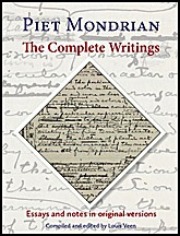 He wrote in Dutch, French and English, his choice of language often depending on his place of residence.
He wrote in Dutch, French and English, his choice of language often depending on his place of residence.
All of Mondrian’s writings proclaim his conviction that art paves the way to a better society.
Many of his texts have been published, but the original versions were often translated, edited, and polished.
This book aims to present the painter’s words as he wrote them, going back to the original sources of all of Mondrian’s manuscripts, typescripts, and personal papers.
Piet Mondrian
The Complete Writings
Louis Veen Ed.
Publisher Primavera Pers
ISBN 9789059972384
640 p,
ills colour & bw,
18 x 25 cm, hb,
Dutch/French/English
€49.50
Piet Mondrian / Mondriaan
new books
fleursdumal.nl magazine
More in: - Book News, - Bookstores, Archive M-N, Art & Literature News, Constuctivisme, Dadaïsme, De Stijl, Piet Mondriaan, Piet Mondriaan
Thank you for reading Fleurs du Mal - magazine for art & literature